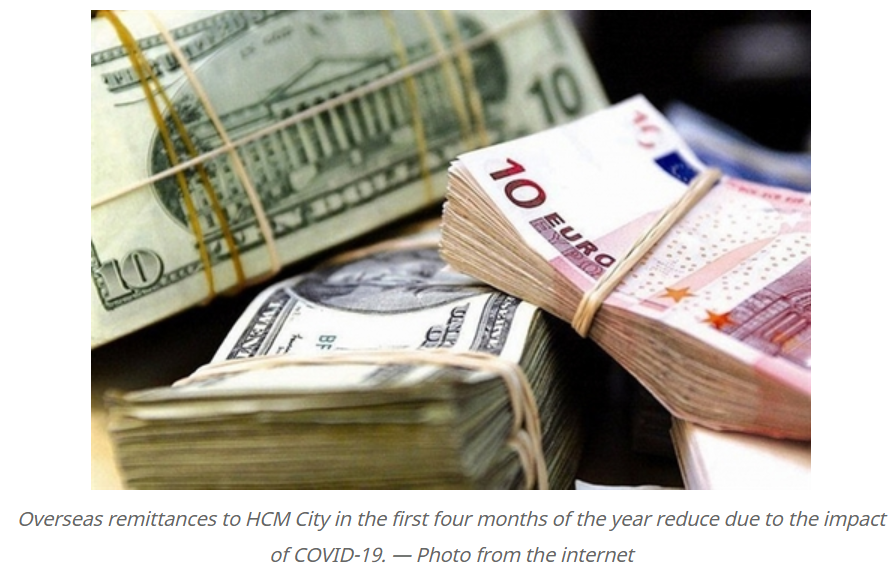Overseas remittances to Vietnam forecasted to drop by 17% this year
 Overseas remittances to Vietnam this year have been forecasted to fall by 17% this year due to the Covid-19 pandemic, according to a local economist.
Overseas remittances to Vietnam this year have been forecasted to fall by 17% this year due to the Covid-19 pandemic, according to a local economist.
Chief Economist Can Van Luc from the Bank for Investment and Development of Vietnam (BIDV) said that Vietnam’s overseas remittances in 2020 would be 10-15% or even 15-17% lower than that of last year if the Covid-19 pandemic continues.
In 2019, Vietnam received total remittances of nearly USD17 billion, placing the nation among the world’s 10 biggest remittance beneficiaries, the World Bank reported.
Luc added that Vietnam’s key labour export markets such as the US, France, South Korea, Japan and Taiwan have been hard hit by Covid-19. “However, Asian countries like South Korea, Taiwan and Japan are expected to control the disease better than many European countries and the US; so the overseas remittances from these markets would fall just slightly,” Luc said.
Vietnam has basically controlled the pandemic and highly appreciated by the international community for this. This year, the country’s GDP growth has been forecasted to reach 4.5-5%, which is a positive sign for Vietnam to continue attracting overseas remittances.
Nguyen Hoang Minh, deputy director of the State Bank of Vietnam’s branch in HCM City, said that in the first four months of this year, overseas remittances sent through the city’s credit organisations were estimated at USD1.8%, down 2% on-year. Meanwhile, the city accounted for around USD5.3 billion out of the country’s total remittances of USD17 billion last year.
Overseas remittances through the Saigon Thuong Tin Commercial Joint Stock Bank in April declined by 20% against March, according to a representative.
A recent report by the World Bank indicated that this year the global overseas remittances would decrease 20% on-year amid the global economic slowdown caused by the Covid-19.
Job losses and lost hours and wages are expected to leave migrants in wealthier nations unable to send as much money home to poorer countries already suffering from coronavirus shutdowns, the report said.
Pandemic causes remittances to HCM City to fall by 2%
Overseas remittances to HCM City in the first four months of the year are estimated to be US$1.8 billion, a year-on-year decrease of 2 per cent, according to the State Bank of Vietnam.
This is the first decline in many years, it said.
Nguyen Hoang Minh, deputy director of the central bank’s HCM City office, said remittances to the city this year are forecast to be lower than last year due to the COVID-19 pandemic.
Some money transfer companies said remittances from abroad declined in the last two months, with some reporting declines of 50 per cent.
According to DongA Money Transfer Co., Ltd, inbound remittances in the first 22 days of April were down by half month-on-month.
Remittances from Europe were down the most, followed by the US, Canada, Australia and Viet Nam’s key labour markets such as South Korea, Taiwan, and Japan.
Key countries for remittances to Viet Nam such as the US, UK and Canada have been hit hard by the pandemic, and ethnic Vietnamese there, like many others, have lost jobs, leading to reduced remittances to their families.
The companies forecast remittances to further fall in the second quarter and said last year’s figure could not be reached if the pandemic prolongs.
Can Van Luc, chief economist at State-owned bank BIDV, said inflows this year could decrease by 10-15 per cent, and even 15-17 per cent in the worst case.
According to the World Bank, global remittances will decline by 20 per cent this year due to the economic crisis caused by the pandemic.
Remittances to low- and middle-income countries are projected to fall by 19.7 per cent to $445 billion.
Viet Nam ranks among the top 10 countries in the world in terms of remittances. They were worth $16.7 billion last year, with HCM City accounting for $5.3 billion
The majority of the money is converted into dong and deposited in banks or invested in business.
Dr Huynh Trung Minh, a financial expert, said, “The decrease in remittances will affect the supply of foreign currencies but not have a big impact on the exchange rate since supply and demand of foreign currencies remain steady.
“Viet Nam’s foreign exchange reserves, … of around $84 billion, are sufficient to stabilise the foreign exchange market in case of fluctuations.”
In 2021 the World Bank expects remittances to LMICs to recover and rise by 5.6 per cent to $470 billion.
Nguoilaodong/DTinews/VNS


 Thailand
Thailand




